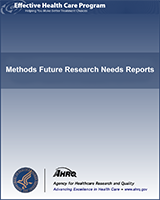NCBI Bookshelf. A service of the National Library of Medicine, National Institutes of Health.
Excerpt
Comparative effectiveness reviews synthesize evidence to inform questions about healthcare topics, but the evidence is not always sufficient to completely answer those questions. Therefore systematic reviews and specifically Evidence-based Practice Center (EPC) reports may identify research gaps and make recommendations for future research to address these unanswered questions. One useful adjunct to these recommendations is an analysis of the research that is currently in the pipeline. This additional information can be used to prioritize the research gaps in the report. Identified research gaps on topics for which several large studies are underway can be described as a lower priority future research need. Identified research gaps on topics with few studies underway may rise as priorities for future research. Prioritizing the research gaps this way can also guide funding agencies in decisions about which topics may need additional research funding. The information provided about ongoing studies can provide indications about when to update reviews.
This project assessed this potential adjunct of reviewing ongoing studies when addressing future research needs through two aims. First sources of information that can be used to identify ongoing studies relevant to the research gaps were analyzed. Second, we evaluated the value that could be added by utilizing these sources in refining the research recommendation section of an EPC report. The second aim was to determine if there are characteristics of ongoing studies that can be used to predict which studies will be completed as planned and published in a timely manner.
Contents
Suggested citation:
Brasure M, Shamliyan T, Butler M, Kane RL. Finding Evidence on Ongoing Studies. Methods Future Research Needs Report No. 1. (Prepared by the Minnesota Evidence-based Practice Center under Contract No. 290-2007-10064-I.) AHRQ Publication No. 11-EHC018-EF. Rockville, MD: Agency for Healthcare Research and Quality. December 2010. Available at: www.effectivehealthcare.ahrq.gov/reports/final.cfm.
This report is based on research conducted by the Minnesota Evidence-based Practice Center (EPC) under contract to the Agency for Healthcare Research and Quality (AHRQ), Rockville, MD (Contract No. 290-2007-10064-I). The findings and conclusions in this document are those of the author(s), who are responsible for its contents; the findings and conclusions do not necessarily represent the views of AHRQ. Therefore, no statement in this report should be construed as an official position of AHRQ or of the U.S. Department of Health and Human Services.
The information in this report is intended to help health care researchers and funders of research make well-informed decisions in designing and funding research and thereby improve the quality of health care services. This report is not intended to be a substitute for the application of scientific judgment. Anyone who makes decisions concerning the provision of clinical care should consider this report in the same way as any medical research and in conjunction with all other pertinent information, i.e., in the context of available resources and circumstances.
This report may be used, in whole or in part, as the basis for research design or funding opportunity announcements. AHRQ or U.S. Department of Health and Human Services endorsement of such derivative products may not be stated or implied.
This information does not represent and should not be construed to represent a determination or policy of the Agency for Healthcare Research and Quality or the U.S. Department of Health and Human Services.
None of the investigators have any affiliations or financial involvement that conflicts with the material presented in this report.
- 1
540 Gaither Road, Rockville, MD 20850; www
.ahrq.gov
- NLM CatalogRelated NLM Catalog Entries
- Review Evaluating the Potential Use of Modeling and Value-of-Information Analysis for Future Research Prioritization Within the Evidence-Based Practice Center Program[ 2011]Review Evaluating the Potential Use of Modeling and Value-of-Information Analysis for Future Research Prioritization Within the Evidence-Based Practice Center ProgramMyers E, Sanders GD, Ravi D, Matchar D, Havrilesky L, Samsa G, Powers B, McBroom A, Musty M, Gray R. 2011 Jun
- The future of Cochrane Neonatal.[Early Hum Dev. 2020]The future of Cochrane Neonatal.Soll RF, Ovelman C, McGuire W. Early Hum Dev. 2020 Nov; 150:105191. Epub 2020 Sep 12.
- Review Systematizing the Use of Value of Information Analysis in Prioritizing Systematic Reviews[ 2012]Review Systematizing the Use of Value of Information Analysis in Prioritizing Systematic ReviewsHoomans T, Seidenfeld J, Basu A, Meltzer D. 2012 Aug
- The Effectiveness of Integrated Care Pathways for Adults and Children in Health Care Settings: A Systematic Review.[JBI Libr Syst Rev. 2009]The Effectiveness of Integrated Care Pathways for Adults and Children in Health Care Settings: A Systematic Review.Allen D, Gillen E, Rixson L. JBI Libr Syst Rev. 2009; 7(3):80-129.
- Modelling approaches for histology-independent cancer drugs to inform NICE appraisals: a systematic review and decision-framework.[Health Technol Assess. 2021]Modelling approaches for histology-independent cancer drugs to inform NICE appraisals: a systematic review and decision-framework.Murphy P, Glynn D, Dias S, Hodgson R, Claxton L, Beresford L, Cooper K, Tappenden P, Ennis K, Grosso A, et al. Health Technol Assess. 2021 Dec; 25(76):1-228.
- Finding Evidence on Ongoing StudiesFinding Evidence on Ongoing Studies
Your browsing activity is empty.
Activity recording is turned off.
See more...
